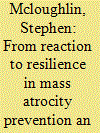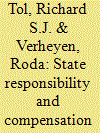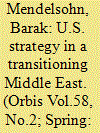|
|
|
Sort Order |
|
|
|
Items / Page
|
|
|
|
|
|
|
| Srl | Item |
| 1 |
ID:
149064


|
|
|
| 2 |
ID:
193255


|
|
|
|
|
| Summary/Abstract |
Article 8 of the Paris Agreement introduces obligations upon the Parties to the Agreement “with respect to Loss and Damage associated with adverse impacts of climate change.” According to Paragraph 52 of the Conference of the Parties’ Decision, Article 8 is not a basis for liability or compensation. Therefore, the problem is whether violation of obligations leads to a state responsibility. Using a dogmatic method, this research contends that “recognizing the significance of averting, minimizing, and addressing Loss and Damage” means acceptance of responsibility for a breach of obligations. Although the means of seeking reparation would not be compensation, States are obliged to eliminate sources of damage and take precautionary measures to address loss and damage. Notwithstanding this, placing the issue of loss and damage under the Agreement into a separate article can reflect to a great extent the significance of the matter.
|
|
|
|
|
|
|
|
|
|
|
|
|
|
|
|
| 3 |
ID:
186078


|
|
|
|
|
| Summary/Abstract |
The legal immunity of the UN has focused the peacekeeping literature on individual accountability and the political willingness of States to prosecute their own. UN immunity applies to peacekeeping operations only when the UN is in effective control. When a State is exerting effective control over its contingent, either solely or jointly, the actions of peacekeepers will be attributed to that State. When States are in effective control, they cannot rely on UN immunity for breaches of their obligations. Once a State is exercising effective control, it must warrant that sufficient mechanisms are undertaken to fulfil its obligations under the law, specifically the extra-territorial nature of international human rights law. The Mothers of Srebrenica case highlights that peacekeeping accountability is not limited to the prosecution of individual peacekeepers. Although UN immunity limits specific avenues of legal recourse, it does not prevent victims from seeking accountability from Troop Contributing Countries.
|
|
|
|
|
|
|
|
|
|
|
|
|
|
|
|
| 4 |
ID:
050511


|
|
|
|
|
| Publication |
June 2004.
|
| Summary/Abstract |
Customary international law has that countries may do each other no harm. A country violates this rule if an activity under its control does damage to another country, and if this is done on purpose or due to carelessness. Impacts of climate change fall under this rule, which is reinforced by many declarations and treaties, including the UNFCCC. Compensation for the harm done depends on many parameters, such as emission scenarios, climate change, climate change impacts and its accounting. The compensation paid by the OECD may run up to 4% of its GDP, far exceeding the costs of climate change to the OECD directly. However, the most crucial issues are, first, from when countries can be held responsible and, second, which emissions are acceptable and which careless. This may even be interpreted such that the countries of the OECD are entitled to compensation, rather than be obliged to pay. State responsibility could substantially change international climate policy.
|
|
|
|
|
|
|
|
|
|
|
|
|
|
|
|
| 5 |
ID:
165064


|
|
|
|
|
| Summary/Abstract |
Since the Saudi-led coalition (Coalition) began its military campaign in Yemen in March 2015, upwards of 13,000 Yemen civilians have been killed, including nearly 2000 women and 3000 children. Additionally, Coalition aerial attacks have intentionally targeted Yemen’s civilian infrastructure, economic infrastructure, medical facilities and cultural heritage. Combined with the ongoing air and naval blockade, which has impeded the ability of Yemenis to access clean water, food, fuel and health services, the violence visited upon Yemen has created near-famine conditions. Furthermore, United Nations Children’s Fund (UNICEF) predicts another imminent outbreak of cholera, with the potential to be as deadly as last year’s which infected more than one million children and killed a child every 10 minutes. Through engagement with genocide studies literature, this article applies a holistic conception of genocide to the Coalition military campaign. It finds that the Coalition is conducting an ongoing campaign of genocide by a ‘synchronised attack’ on all aspects of life in Yemen, one that is only possible with the complicity of the United States and United Kingdom.
|
|
|
|
|
|
|
|
|
|
|
|
|
|
|
|
| 6 |
ID:
174587


|
|
|
|
|
| Summary/Abstract |
There has never been any State practice in pursuing State responsibility for alleged malfeasances in pandemics. What effect does this absence of practice have on the framework of applicable law regarding this pursuit of State responsibility? How can we make sense of this absence in the context of global public health? One way would be to see the absence as reflecting a lex specialis providing for no State responsibility for any alleged malfeasances; another as reflecting States’ assessment that there is no or slight chance of success even under a lex generalis not excluding potential responsibility. The former appears more consonant with the uniform lack of practice in pursuing State responsibility over the long course of history of dealing with pandemics. If there can be a better state of affairs, it will be up to States to search for it and to bring it to fruition in the future.
|
|
|
|
|
|
|
|
|
|
|
|
|
|
|
|
| 7 |
ID:
129905


|
|
|
|
|
| Publication |
2014.
|
| Summary/Abstract |
In light of the uncertainty surrounding the Middle East stemming from the Arab Awakening, and the inability of Washington to shape the process of transition, U.S. decision- makers must rethink their strategy for the region in general and for counterterrorism in particular. Reducing U.S. involvement in the region and letting the dust settle will serve American interests better and allow for building healthier relations with Middle Eastern countries. At the same time, since the risk of negative effects on neighboring states that accompany transition must be kept in check, the United States, together with other powers, should lead the international community in reviving the principle of "state responsibility" as a productive way to reduce spillover of conflicts and even provide incentives for actors in the region to limit violence.
|
|
|
|
|
|
|
|
|
|
|
|
|
|
|
|
|
|
|
|
|